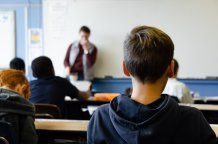
Deaf education should be remodelled to replace the role previously provided by specialist schools which have closed, Dr Hannah Anglin-Jaffe argues in a study in the British Education Research Journal.
New dedicated hubs for Deaf children are needed around the country to provide new social spaces, education and support, an expert has said.
Special schools for Deaf children have had an important role in the Deaf community, acting as places people can meet and learn BSL together. But the move to inclusive education and new technology such as cochlear implants means most children with hearing loss are now educated in mainstream schools.
Deaf education should be remodelled to replace the role previously provided by specialist schools which have closed, Dr Hannah Anglin-Jaffe argues in a study in the British Education Research Journal.
Dr Anglin-Jaffe proposes Deaf education and support could be run in the same way as existing community provision in schools and other social spaces such as libraries or community centres. These hubs could act as a new iteration of the special school for the Deaf and host Deaf clubs, specialist provision, pastoral support and social activity.
The hubs could provide expertise on visual learning methods, sign language tuition for children and their families and could also facilitate a meeting place for Deaf people of all ages. The hubs would work in partnership with mainstream schools and peripatetic Teachers of the Deaf to enable access to a broad mainstream curriculum.
Dr Anglin-Jaffe said: "There is a need for Deaf children to access Deaf culture and sign language, whilst maintaining the positive achievements of inclusive practice such as raised expectations, family and community belonging and high academic achievement.
"Statistics suggest there are now less specialist provision for Deaf children in mainstream schools. We need to find new social spaces which meets the needs of Deaf children and adults."
Many special schools have closed and those that survive are faced with the threat of closure. They also support children with complex and additional needs. Whenever a school is threatened with closure grass roots activism from the Deaf community is mobilised, showing they inspire strong feelings of loyalty from parents, pupils, staff and the Deaf community.
The key features of the new Deaf education hubs proposed by Dr Anglin-Jaffe would be the ability for Deaf children to meet with their peers and use sign language. This would safeguard the existence of culturally significant places and social spaces for the Deaf community.
Hubs could be set up in areas where there are Deaf children who could benefit from access to BSL. They could be coordinated by local authorities and social enterprises.
Dr Anglin-Jaffe said: "New hubs within communities could provide linguistic support, social space and access to a peer group. Young Deaf children would spend part of their time learning and socialising there, and the majority in mainstream schools local to their families.
"From this hub 'ripples' could expand allowing Deaf children to engage as bilingual and bicultural learners moving between different languages and developing positive identities. This will challenge the perception of a hostile, inaccessible 'hearing world'. Empowering young Deaf children to see the whole world as theirs to inhabit would be a profound but welcome change at the heart of Deaf education."






